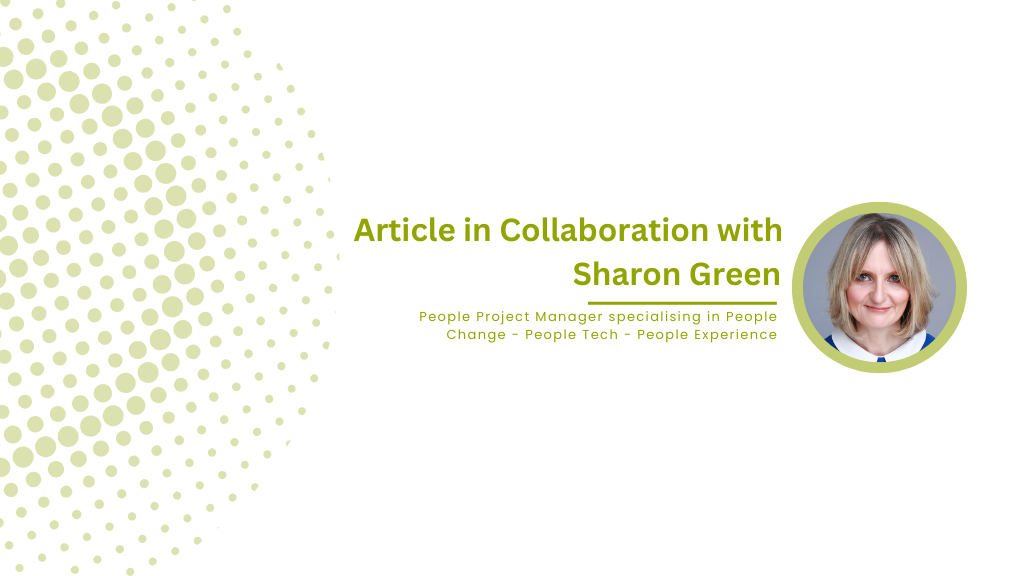
“Sharon Green—like the color,” she says with a smile. Based in London, Sharon has built a career as a professional interim, trained coach, and occasional consultant. For nearly two decades, Sharon has worked independently, helping organizations navigate complex change, implement technology, and enhance the human experience at work. Her expertise spans three interconnected areas: people change, people technology, and people experience.
“I prefer that, if I do consultancy work, I actually help clients to implement,” she explains. “That’s what an interim does—they manage the project.”
The Human Side of Transformation
When asked what makes or breaks transformation initiatives, Sharon doesn’t hesitate. “I’d probably pick two,” she says. “Getting buy-in and engagement from stakeholders as early as possible, and communication. Communication plans connected with transformation are usually an afterthought, rather than being baked in from the start.”
Her emphasis on people is deliberate. In her view, successful transformation requires leaders to recognize their influence, something she finds even seasoned executives sometimes overlook. “Leaders often forget that they’re leaders in an organization, and what that positional power really means. It affects both their understanding of what’s happening and how others respond to them.”
Balancing Empathy and Accountability
In high-stakes transitions, Sharon’s approach starts with trust. “Empathy is present all the time,” she says. “As an interim, you’re temporary, so you need to build trust quickly. That way, when you hold someone to account, they know it’s coming from a good place, as part of being an honest and wise counsel.”
This trust-building is rooted in her own career journey. Moving from a permanent corporate role to independent work required a mindset shift. “It’s balancing the short-term work with the long-term goals of the organization,” she reflects. “You’re accompanying them for part of the journey, but you still want to show you’re invested in where they’re going.”
Another shift was the loss of built-in authority. “When you’re permanent, status is conveyed automatically. As an interim, you don’t manage anyone or have a fancy title. You lead through influence and persuasion.”
A Coach Who Was Coached
One of Sharon’s pivotal career moments came before she even became a coach. “I had a couple of coaches at key points who helped me navigate career changes,” she recalls. “And I had inspirational line managers whose counsel I still value. Those experiences shaped how I coach and lead today.”
Coaching in the Age of AI
With AI and digital tools reshaping industries, Sharon sees a crowded and shifting coaching market. “You might have a coach in your pocket through AI, or platforms that connect you instantly to coaches. But the human element—that’s where the added value is. Tech enables access, but it’s the human interaction that makes the real difference.”
Building Culture Without Erasing Identity
For Sharon, creating a unified culture in global organizations begins with engagement. “Start by involving people in the design of what you’re trying to achieve. Identify the non-negotiable principles at the core, then give flexibility within a framework. That way, people can adapt to local cultural factors while staying true to the ‘North Star.’”
She’s also alert to cultural red flags—especially the absence of challenging conversations. “If everyone’s being so nice they’re not being honest, that’s a concern,” she says. Her perspective on resistance is refreshingly open. “I went on a course where the quote was, ‘Resistance is a gem to be mined.’ If you get curious about it, it stops being something to squash and becomes part of the process.”
Advice for Emerging Leaders
For those starting their leadership journey—or stepping into interim work—Sharon’s counsel is straightforward: “Be open. See your career as a journey, not a straight track. Learn to handle ambiguity and see it as a chance for new doors to open. That mindset keeps you adaptable in a world that’s changing fast.”
In a career defined by navigating complexity, Sharon’s message is clear: technology may drive change, but it’s people—listening to them, engaging them, and trusting them—who make transformation work.
